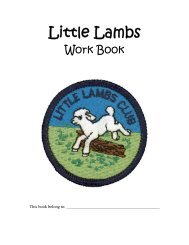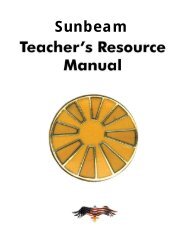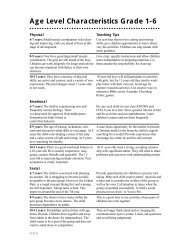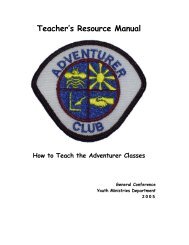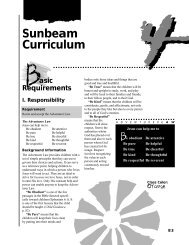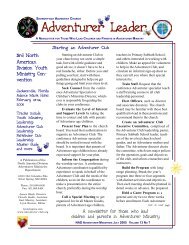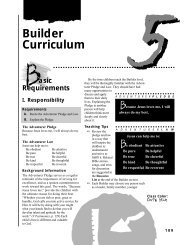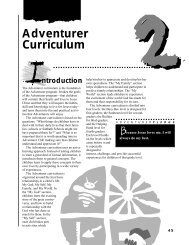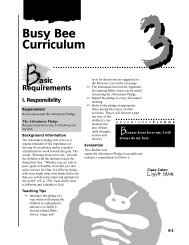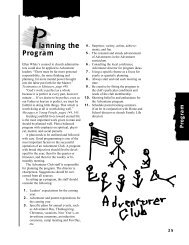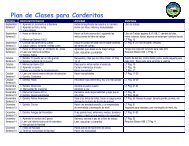Adventurer Awards - KFW Adventurers
Adventurer Awards - KFW Adventurers
Adventurer Awards - KFW Adventurers
Create successful ePaper yourself
Turn your PDF publications into a flip-book with our unique Google optimized e-Paper software.
A D V E N T U R E R M A N U A L<br />
○ ○ ○ ○ ○ ○ ○ ○ ○ ○ ○ ○ ○ ○ ○ ○ ○ ○ ○ ○ ○ ○ ○ ○ ○ ○ ○<br />
Grade 3<br />
Requirement<br />
Updated in 1996.<br />
Media Critic<br />
1. Explain what is meant by the term<br />
“media.” Cite four examples.<br />
2. Memorize Philippians 4:8 and discuss<br />
three principles that help us form good<br />
reading, viewing and listening habits.<br />
3. Keep a log of the time you spend each<br />
day with the different types of media.<br />
Note whether the media is Christcentered<br />
or secular. Do this for two<br />
weeks.<br />
4. Do one of the following with an adult:<br />
a. watch television<br />
b. read a story<br />
c. listen to a recording<br />
Become a “media critic” and discuss<br />
the merits of each.<br />
5. With an adult, use a television guide,<br />
book club listing, etc., to choose what<br />
you will read or watch next week.<br />
6. After your teacher reads the beginning<br />
of a short story, make up your own<br />
ending.<br />
Helps<br />
1. Media are forms of communication<br />
that reach a large number of people,<br />
such as newspapers and magazines,<br />
television, films and videos, books,<br />
radio and musical recordings.<br />
Explain to the children that the<br />
media are in themselves, neutral,<br />
and that they can be used for good<br />
or bad. Explain to them that in<br />
today’s society they will be bombarded<br />
by media messages, and that<br />
it is hard not to be affected by what<br />
they see and hear and read. That’s<br />
why it is important to learn to<br />
control the media by choosing what<br />
they will expose themselves to.<br />
2. Read Philippians 4:8 and teach the<br />
children to use it as a guideline in<br />
making choices about what to do<br />
and see. Discuss these principles<br />
with the children, explaining them<br />
to the children and asking them to<br />
tell you what they have learned<br />
from this Bible verse.<br />
3. Teach the children to be aware of<br />
time spent with Jesus compared<br />
with secular activities. Have each<br />
child make a chart keeping track of<br />
their viewing and reading activities<br />
for at least two weeks.<br />
4. Select a story or program that the<br />
child feels will meet the standards<br />
of Philippians 4:8. You cannot<br />
always tell by reading a review or<br />
advertisement if it will be good by<br />
Jesus’ standards. When you begin<br />
reading or viewing, if it is not<br />
proper, stop! Find something else.<br />
Encourage the child to make good<br />
choices.<br />
5. Choosing ahead helps us realize<br />
how much time we spend in these<br />
activities and helps us to be more<br />
selective.<br />
6. Reinforce the principles of good<br />
reading and viewing habits as they<br />
complete the story. Encourage<br />
imagination!<br />
278



